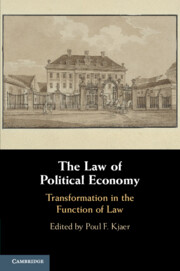Book contents
- The Law of Political Economy
- The Law of Political Economy
- Copyright page
- Dedication
- Contents
- Contributors
- Acknowledgements
- Abbreviations
- 1 The Law of Political Economy
- Part I Studying the Law of Political Economy
- Part II Transformations of the Law of the Globalising Economy
- 5 Law in Global Political Economy
- 6 Law of Natural Resource Extraction and Money as Key to Understanding Global Political Economy and Potential for Its Transformation
- 7 ‘Social Nature’
- Part III The Transformation of the Law of Political Economy in Europe
- Part IV Towards a New Law of Political Economy
- Index
6 - Law of Natural Resource Extraction and Money as Key to Understanding Global Political Economy and Potential for Its Transformation
from Part II - Transformations of the Law of the Globalising Economy
Published online by Cambridge University Press: 18 April 2020
- The Law of Political Economy
- The Law of Political Economy
- Copyright page
- Dedication
- Contents
- Contributors
- Acknowledgements
- Abbreviations
- 1 The Law of Political Economy
- Part I Studying the Law of Political Economy
- Part II Transformations of the Law of the Globalising Economy
- 5 Law in Global Political Economy
- 6 Law of Natural Resource Extraction and Money as Key to Understanding Global Political Economy and Potential for Its Transformation
- 7 ‘Social Nature’
- Part III The Transformation of the Law of Political Economy in Europe
- Part IV Towards a New Law of Political Economy
- Index
Summary
This chapter examines the law of extractive resources and money to clarify law’s constitutive role in political economy and, in particular, its implication in the expansion of exploitation. It also indicates how at various past junctures certain legal institutions have been chosen over possible alternatives. It, thus, draws attention to the “institutional toolbox” available for identifying ways in which law may re-configure and transform political economy. More specifically, the chapter explores the distributive effects that law generates - by allocating jurisdiction and exploitation rights, as well as by submitting distribution conflicts either to resolution through political procedures or market mechanisms. It explains how the principles of permanent sovereignty over natural resources and monetary sovereignty provide the basis not only for domestic, but also for international politics to be conducted in the legal framework of international organisations (international commodity agreements and the IMF). The chapter proceeds to trace how the assertion of government control over natural resources led to the expansion and proliferation of markets, not only because it prompted the emergence of a transnational economic law, but also as it contributed to the reverse integration of the industry and consequent changes in the structure of commodity trade. The chapter points to linkages between resource extraction and trade on the one hand and the demise of Bretton Woods and liberalisation of capital markets on the other hand with the effect of further reducing the scope for politics. Finally, it proposes to take a closer look at monetary design both as a driver of extraction and as a potential means to contain exploitation.
Keywords
- Type
- Chapter
- Information
- The Law of Political EconomyTransformation in the Function of Law, pp. 152 - 180Publisher: Cambridge University PressPrint publication year: 2020



